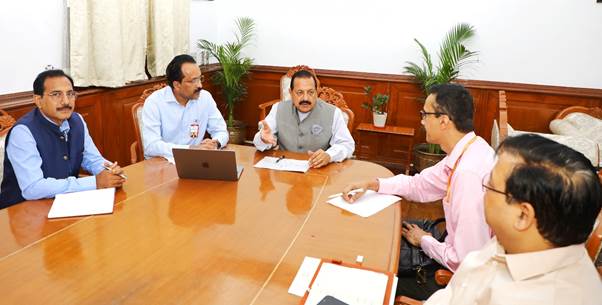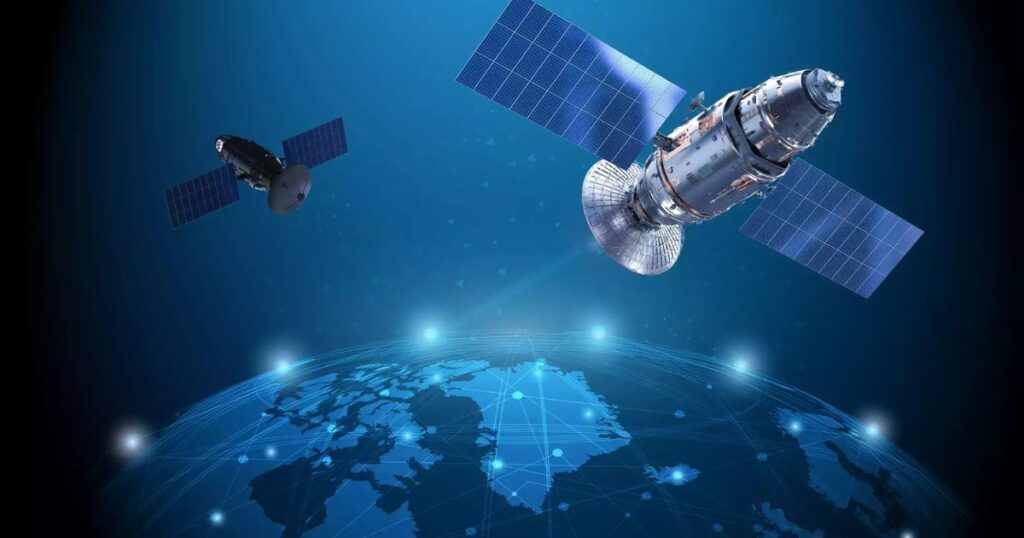NEW DELHI: Dr. Jitendra Singh, Union Minister of State (Independent Charge) for Science & Technology, announced a remarkable 200-fold increase in space startups within just two years. This extraordinary surge is attributed to the forward-looking policy reforms initiated by Prime Minister Narendra Modi, aimed at fostering public-private partnerships and opening the space sector to private enterprises.
Policy Reforms Fuel Growth
Dr. Singh, addressing a high-level meeting in New Delhi to review the Department of Space’s 100-day action plan, highlighted the pivotal role of these policy changes. “The quantum jump in space startups, from a mere 1 in 2022 to nearly 200 in 2024, underscores the impact of the Prime Minister’s decision to open the space sector to private participation,” said the Minister. The meeting was attended by ISRO Chairman S. Somanath and other senior officials, who discussed the current status, opportunities, and future missions of India’s space program.
Union Minister @DrJitendraSingh chaired a high-level meeting to review the 100 days Action Plan of the Department of Space
200 times increase in Space StartUps in just two years, says the Minister
Read here: https://t.co/txEbnJgUoV pic.twitter.com/OidfsHHjf9
— PIB India (@PIB_India) June 20, 2024
ALSO READ: Green Revolution 2.0: PM Modi Unveils Jammu and Kashmir’s $217 Million Agricultural Makeover
Investment and Economic Impact
The space sector has seen substantial investments, with nearly INR 1000 crore pumped into the industry in 2023 alone. This influx of capital has invigorated the sector, creating a dynamic ecosystem that includes around 450 Micro, Small, and Medium Enterprises (MSMEs). These developments align with the Prime Minister’s vision of “Sabka Prayas” during the Amrit Kaal period, emphasizing collective effort and inclusive growth.

Global Ambitions
Looking ahead, Dr. Singh revealed ambitious targets for India’s share in the global space economy. In 2021, India’s contribution stood at 2%, but by 2030, it is projected to rise to 8%, and further to 15% by 2047. This expansion is expected to be driven significantly by the private sector, which has been granted 100% Foreign Direct Investment (FDI) in the space industry. The Minister emphasized that private enterprises would spearhead advancements in small satellites, geospatial technologies, and orbital transfer vehicles.
Technological Transfers and Collaboration
Dr. Singh also underscored the importance of technology transfer from ISRO to private players. To date, 403 technology transfers have been completed, with an additional 50 facilitated by NewSpace India Limited (NSIL) and Indian National Space Promotion and Authorization Center (IN-SPACe). These transfers are crucial for bolstering innovation and enabling private companies to contribute effectively to the space sector.
ALSO READ: From Orphanage to IAS: B. Abdul Nasar’s Inspiring Journey in Civil Service
Upcoming Missions and Collaborative Projects
The meeting also reviewed ISRO’s upcoming missions and projects scheduled for the next 100 days. Key among these is the NISAR program, a collaborative Earth-observing mission between NASA and ISRO, designed to monitor a broad spectrum of environmental changes. Other significant projects include the GSAT-20 satellite, a reusable launch vehicle landing exercise, and a space docking experiment.
Role of Private Sector in R&D
Dr. Singh acknowledged the critical role that private players will play in the research and development (R&D) of the space sector. Their involvement is expected to drive innovations not only in space exploration but also in applications benefiting agriculture, environmental monitoring, and governance.
The remarkable rise in space startups in India marks a new era of growth and innovation, driven by strategic policy reforms and robust public-private collaboration. As India aims to significantly increase its share in the global space economy, the contributions from the private sector and continuous technological advancements will be pivotal in achieving these ambitious goals. With a strong focus on future missions and international collaborations, India’s space sector is poised for unprecedented growth and success.
Detailed Insights and Future Prospects
Dr. Jitendra Singh, during the meeting, emphasized the dramatic increase in space startups, which surged from just 1 in 2022 to nearly 200 in 2024. This 200-fold increase highlights the significant impact of opening the space sector to private enterprises. The Minister pointed out that in 2023 alone, close to INR 1000 crore was invested in India’s space sector, showcasing the sector’s growing attractiveness to investors.
ALSO READ: From Tea Seller To IAS Officer: The Inspiring Journey Of Himanshu Gupta
The space industry in India now includes around 450 MSMEs, reinforcing the Prime Minister’s vision of inclusive growth, encapsulated in the slogan “Sabka Prayas” during the Amrit Kaal period. This collective effort is crucial for sustaining the momentum in the space sector and ensuring broad-based participation in its growth.
India’s Expanding Global Footprint
Dr. Singh revealed that India’s share in the global space economy is set to rise significantly. From a modest 2% in 2021, India’s contribution is projected to increase to 8% by 2030, and further to an impressive 15% by 2047. This growth trajectory underscores the potential of India’s space sector to become a major global player, driven by the innovative capabilities of private enterprises and the supportive policies of the government.
Encouraging Private Sector Participation
The Minister emphasized the critical role of the private sector in advancing the space industry. By allowing 100% FDI in the space sector, India has opened up new avenues for innovation and growth. Private enterprises are expected to lead the way in developing advanced small satellites, geospatial technologies, and orbital transfer vehicles, among other cutting-edge technologies.
Technology Transfer and Industry Collaboration
Technology transfer from ISRO to private companies has been a cornerstone of this growth. As of 2020, there were 403 technology transfers, with an additional 50 facilitated by NSIL and IN-SPACe. These transfers enable private companies to leverage ISRO’s expertise and technologies, fostering a collaborative ecosystem that drives innovation and growth.
Upcoming Space Missions
The meeting also reviewed ISRO’s ambitious plans for the next 100 days, which include several high-profile missions and projects. The NISAR program, a joint Earth-observing mission between NASA and ISRO, aims to provide comprehensive data on environmental changes. Additionally, the GSAT-20 satellite, a reusable launch vehicle landing exercise, and a space docking experiment are among the key projects on the horizon.
R&D and Private Sector Involvement
Dr. Singh highlighted the importance of private sector involvement in research and development (R&D) within the space sector. Innovations driven by private enterprises are expected to significantly impact not only space exploration but also various sectors such as agriculture, environmental monitoring, and governance. The collaborative efforts between ISRO and private companies are crucial for maintaining India’s competitive edge in the global space economy.
India’s space sector is experiencing an unprecedented surge in growth and innovation, driven by strategic policy reforms and active public-private collaboration. The remarkable increase in space startups, substantial investments, and ambitious future targets reflect the sector’s dynamic potential. With continuous support from the government and the active involvement of private enterprises, India’s space sector is well-positioned for sustained growth and global leadership. The future of India’s space exploration looks promising, with a strong focus on technological advancements and international collaborations.


